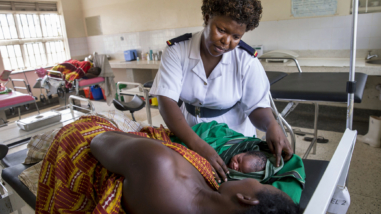A mother and her daughter in Keur Alpha, Senegal read a coloring book created by Tostan, a grantee of our Global Development and Population Program. (Photo Credit: Jonathan Torgovnik/ Reportage by Getty Images, licensed under CC BY NC 4.0)
Policy matters. If I had to name the one assumption on which most of our grantmaking hangs—at least in the Global Development and Population Program—that would be it. We support organizations that study the impact of social and economic policies, and we support groups that advocate policy change that favors marginalized populations in countries around the world. We believe that when responsive, technically sound policies are adopted, people will be better off: women will have access to more and better health care, schools will do a better job of teaching kids to read, write, and do arithmetic, good jobs will be more plentiful.
In some domains—particularly around expanding reproductive and economic choices for women—we have a point of view about the policy agenda, and it’s a perspective strongly held by the foundation for decades. But we have a larger agenda: trying to increase the chances that those who are making policies have and use the best available evidence, and citizens who are affected have crucial information and channels of influence so that they can be heard at high levels.
That’s the story behind grants that are awarded to think tanks, universities, large policy-oriented international NGOs and even small advocacy groups in Mexico, as well as in countries in East and West Africa. It’s why, to put it plainly, a grantmaking program aiming to benefit the poor sends checks to organizations that are led and staffed by people who are, at the very least, not poor.
We could go about things a completely different way, of course. We could (and occasionally do) just pay for health care, or teachers’ salaries, or books. This is what many aid programs, both public and private, have done for decades. We could even recommend to our president and Board that we distribute money directly to poor people, as our friends at Give Directly do so well. If we took that route, we could stop sending those checks to the elite researchers, advocates, and institutions; we could skip policy and go to people. We could be certain that we were contributing to improvements in living conditions among known communities, in ways we could see and touch.
But the direct-to-people model of grantmaking, appealing as it is, doesn’t fulfill the responsibility we’re entrusted with by our Board. We’re asked to make as big a positive difference as possible with the resources available, and the way to do that is by acting on the levers through which a few dollars can affect many people over a long time: policy, markets, or technology. Most of the time, we choose to work on policy.
I think it’s the right choice, but I also think we have to be wary of believing our own stories too much. Knowing that the words on paper can be a lot prettier than the reality, we have to pay as much attention to the implementation of “good” policies as to their adoption. We also have to place priority on research and advocacy that reflect real experiences and foster greater empowerment.To do that, we can learn from those rare organizations, like WIEGO and Twaweza, that are based on principles of deep and genuine participation of people who otherwise would have no path to political power. We are watching with interest the experimental approaches that Feedback Labs and others are taking to connect people-level information to program- and policy-level decisions. And we are continuing to do grantmaking to support groups like Marie Stopes International as they provide services that help people in very direct and immediate ways. Although we’re at U.S. foundation with no in-country presence, we’re trying to keep our feet on the ground.
Policy matters, yes. But what really matters, after all is said and done, is people.



